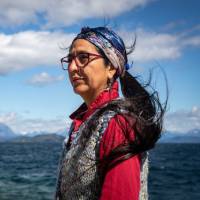Territorio y resistencias mapuche en la Norpatagonia extractivista: tensiones entre movilidades forzadas y el retorno al territorio
-
Lorena Cañuqueo, Universidad Nacional de Río Negro; and Ana Vivaldi, Latin American Studies
Online via Zoom
Thursday, February 13, 5-6 pmin the series
Green College Special Online Event -
The expansion of neo-extractivism in Latin America led by multinational corporations has relied on and been accompanied by substantial political reforms that negatively affect environmental, Indigenous and human rights. In the Argentine province of Río Negro in northern Patagonia, these projects involve open-pit mining, green hydrogen, fracking, wind farms, and hydroelectric dams. The government of Río Negro did not consult with Indigenous communities before granting mining exploration permits in their territories. Meanwhile, soy production, in northern Argentina, has equally advanced over peasant and Indigenous lands with no consultation or compensation. In both locations, Indigenous communities have demanded, through administrative and legal channels, that their constitutional right to consultation and consent be respected. Similar stories play out all over the Americas.
Please note that this event is online only and the language of the discussion is Spanish.
This event is co-organized with Benjamin Bryce, Department of History, and Latin American Studies. It is asked that you RSVP for this free event here.
 Lorena Cañuqueo is a researcher, activist, and member of the Mapuche Nation (the Mariano Epulef Mapuche community). She holds a degree in Social Communication and a PhD in Anthropology and is currently a professor at the National University of Río Negro in Northern Patagonia, Argentina. Her research examines the ongoing effects of the genocide against Indigenous peoples during the late 19th and early 20th centuries, as reflected in the present. Specifically, her work explores how these effects manifest in local, provincial, and national policies related to land access and, more recently, in the implementation of extractive projects.
Lorena Cañuqueo is a researcher, activist, and member of the Mapuche Nation (the Mariano Epulef Mapuche community). She holds a degree in Social Communication and a PhD in Anthropology and is currently a professor at the National University of Río Negro in Northern Patagonia, Argentina. Her research examines the ongoing effects of the genocide against Indigenous peoples during the late 19th and early 20th centuries, as reflected in the present. Specifically, her work explores how these effects manifest in local, provincial, and national policies related to land access and, more recently, in the implementation of extractive projects.
 Ana Vivaldi’s research brings the politics of indigeneity and race into inquiries into space, the city, and mobilities. Through collaborative ethnography, she investigates artistic challenges to racism and changing forms of racial inequality in Argentina.Her scholarship emerges from long-term relationships with Indigenous people and movements in Argentina, now including Marrón and Afro Latin-American organizations as well. She teaches in the UBC Latin American Studies program and the Department of Sociology.
Ana Vivaldi’s research brings the politics of indigeneity and race into inquiries into space, the city, and mobilities. Through collaborative ethnography, she investigates artistic challenges to racism and changing forms of racial inequality in Argentina.Her scholarship emerges from long-term relationships with Indigenous people and movements in Argentina, now including Marrón and Afro Latin-American organizations as well. She teaches in the UBC Latin American Studies program and the Department of Sociology.

-
Unless otherwise noted, all of our lectures are free to attend and do not require registration.
Custom Lecture Fields
|